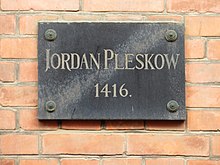Jordan Pleskow

Jordan Pleskow (* after 1357 in Lübeck ; † October 23, 1425 ibid) was mayor of the Hanseatic city of Lübeck.
Life
Jordan Pleskow was the son of Lübeck councilor Arnold Pleskow . In 1386 he acquired the house at Johannisstrasse 20 . From 1416 he lived in what would later become the lodge house on St.-Annen-Straße .
As a councilor he represented the city for the first time in 1391 at the Hanseatic Congress , took part as the city's envoy in 1394 in negotiations with Duke Johann von Mecklenburg in Rostock about the fate of Albrecht von Mecklenburg and was then commander in chief of the Hanseatic occupation of the City of Stockholm held as a pledge . In 1399 the mayor Hinrich Westhof was in Nyköping for negotiations with Margarethe I and the two Wendish Hanseatic cities . In 1400, Jordan Pleskow was appointed mayor by the city council. As such, in 1401 he mediated between Duke Albrecht of Holland and the sister city of Hamburg . Almost at the same time he fought a joint attack by the dukes Barnim VI militarily . from Pommern-Wolgast and Balthasars from Mecklenburg-Werle-Güstrow to the Lübeck countryside .
Little known, but not in Mecklenburg , the Rothener Mühle was located between Sternberg and Mustin an der Mildenitz , which is of historical importance for the Lübeck Hanseatic League. In retaliation for the Werl raids, the Lübeckers moved to Sternberg in 1404 and devastated the Parchim area as far as Güstrow . Mayor Wulf Wulflam von Stralsund brokered a preliminary peace that led to peace in Wismar in 1404 . This provisional peace was concluded on October 19, 1404 on the Rothener Mühle, which was on impartial, ducal Mecklenburg territory. The mill was apparently the headquarters of the Hanseatic League, which also housed the mayor Jordan Pleskow of Lübeck. After negotiations in 1404 between Margarethe and the Grand Master of the Teutonic Order , in 1406 he was again given command of the troops that had to take action against Duke Balthasar and brought the matter to a satisfactory conclusion for Lübeck.
He is best known for his indomitable demeanor in the riot of 1408. In connection with tax claims, the lower classes took action against the unrestricted right of self-supplementation of the council, and requested participation in the regiment themselves. When the crowd threatened to riot around the town hall and the committee citizens elected by the people urged the Senate to give in, the well-known appearance took place. The committee citizens asked the Mayor Marquard von Dame what they should say to the people regarding the council election and he replied: Say what you want and you can answer. The windows of the town hall were opened and called out: “Gy hebben de Kore!” (You have the choice of council) The word could no longer be withdrawn, but 14 council members, including the mayors Westhof and Pleskow, left the city. However, the imperial court ruled in favor of the old council , for which Pleskow stood up. The imperial ban was imposed on Liibeck ; the other cities, which lacked the firm hand of the old council in the management of foreign affairs in the suburbs of the Hanseatic League, relied on it.
On June 16, 1416, the old council made its solemn entry, headed by its tireless champion Jordan Pleskow , who was led by the imperial ambassador Jakob von Zedlitz . Pleskow's personality quickly managed to win back the hearts of the citizens in the city and the head of the Hanseatic League to regain his old reputation. Pleskow took over the official business as mayor again. He continued to work as a military leader and had Lübeck's supreme command during the conquest of Bergedorf in 1420. Together with the Hamburg mayor Hein Hoyer , he then obtained the Perleberg Treaty . Jordan Pleskow was the city's most prominent foreign politician in the first quarter of the 15th century and personally attended diplomatic missions until the end. In Lübeck citizens' wills he is listed several times as a documentary witness and guardian .
He was a member of the circle society and, among other things, owner of the Pronstorf estate in Holstein . Pleskow was buried in the Lübeck Aegidienkirche below the pulpit. His grave slab is described in the literature, but has not been preserved. His son Jordan Pleskow also became a councilor in Lübeck after his father's death.
literature
- Emil Ferdinand Fehling : Lübeck Council Line. Lübeck 1925. No. 425.
- Klaus Krüger: Corpus of medieval grave monuments in Lübeck, Schleswig, Holstein and Lauenburg 1100-1600 , Jan Thorbeke Verlag, Stuttgart 1999, pp. 473-474 ISBN 3-7995-5940-X
- Jürgen Wiegandt: The Plescows - A contribution to the emigration of Wisby merchant families to Lubeck in the 13th and 14th centuries: (Sources and representations on Hanseatic history) 1988
- City Papers ; Lübeck, January 9th, 1904, article: History of an old Lübeck gabled house
Web links
Individual evidence
- ^ Ulrich Graf von Oeynhausen: History of the knightly estate Mustin, Sternberg district. 1905, p. 31.
- ↑ Hansische Geschichtsblätter 1878, 111
- ↑ Gunnar Meyer: “possessing citizens” and “miserable sicknesses”: Lübeck's society in the mirror of their wills 1400–1449 (publications on the history of the Hanseatic city of Lübeck, published by the archive of the Hanseatic city, series B, volume 48) Lübeck: Schmidt-Römhild 2010 ISBN 978-3-7950-0490-3
| personal data | |
|---|---|
| SURNAME | Pleskow, Jordan |
| BRIEF DESCRIPTION | Mayor of the Hanseatic City of Lübeck |
| DATE OF BIRTH | after 1357 |
| PLACE OF BIRTH | Lübeck |
| DATE OF DEATH | October 23, 1425 |
| Place of death | Lübeck |

